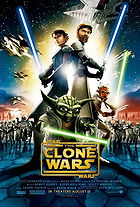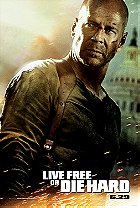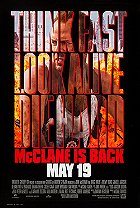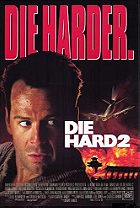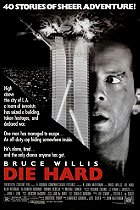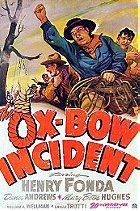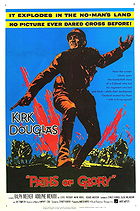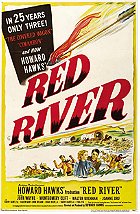Robin Hood: "Fluently."
Even after numerous decades and incalculable subsequent retellings of the Robin Hood legend, Warner Bros.' 1938 production of The Adventures of Robin Hood is still the definitive filmic retelling of the swashbuckling hero. Whether or not you're accustomed to this wonderful 1938 production, you'll discover everything here that you've always remembered about Robin Hood: his fight with Little John, Friar Tuck's rotund rascality, the rescue from the gallows, the romance, the swordplay and even reasoning for Robin's reputation - stealing from the rich and giving to the poor.
The Adventures of Robin Hood contains action and intrigue aplenty, intrepid heroes and beautiful maidens in distress, torrents of flying arrows, exciting sword-fighting, and derring-do galore. This film is the paradigmatic blueprint by which all epic swashbuckling adventure films adhere to. Even if this screen gem is cheesy beyond all belief, it holds up as an entertaining, charming adventure as well as an endearing piece of nostalgia. Kids and adults alike of any age will be immediately charmed by the delightful colours, appealing acting, thrilling swordplay and the enchanting screenplay.
The familiar tale of Robin Hood is here: King Richard (Hunter) leaves England to fight in the Crusades, and is taken prisoner. Richard's brother Prince John (Rains) aspires to take the throne, and under his power-hungry reign he makes life tough for the Saxons as they are heavily taxed. The valiant Sir Robin of Locksley (Flynn) soon discovers that John is hoarding money for himself as opposed to using it for King Richard's ransom. He's a loyal Saxon and a noble man disgraced at the outrageous behaviour of Prince John. Robin is forced to turn outlaw and organises a revolt, taking his band of Merry Men into Sherwood Forest for hiding to create a resistance movement. Robin and his gang do what they do best: robbing from the rich and giving to the poor while working to ensure the nefarious Prince John doesn't take the throne.
No story of Robin Hood is complete without the inclusion of Maid Marian (de Havilland). At first she thinks Robin is a common thief, but his charm and patriotism soon wins her heart. As Robin and his Merry Men stand up against their oppressors swords are clanged, volleys of arrows are launched, and castle battlements are climbed.
The Adventures of Robin Hood may be the most exciting retelling of any vintage legend ever filmed. With eye-popping, gorgeously saturated reds, greens, yellows, and purples, the movie is an extravagant visual feast. Immersing yourself in all the stimuli of Sol Polito and Tony Gaudio's lush cinematography is entertainment in itself. This film is a beautiful banquet of breathtaking images, but it additionally supplies so much more. There's romance, acrobatic swordfights, thrilling acts of archery, witty banter, and an abundance of astounding stunts (a majority actually performed by Flynn himself) - all faultlessly balanced to garner universal appeal.
Tilting the scales at just over $2 million, The Adventures of Robin Hood was Warner's most expensive picture at the time, and every penny of its budget is on glorious display. Directors William Keighley and Michael Curtiz recreate medieval 12th century England with marvellous gusto, from its voracious feasting and barbaric customs to its garish costumes and portentous pageantry. Thanks to Ralph Dawson's accomplished editing and Erich Wolfgang Korngold's inspiring score (both of which earned Oscars), the film achieves an enviable symbiosis of pace and aura. The Adventures of Robin Hood was Warner's top-grossing production of 1938. Its boundless energy, rousing swordplay, superior production values and watchable performances keep it fresh and entertaining all these decades later.
The legend of Robin Hood remains a mainstay in American cinema and global mythology, regardless of the shape he's taken. The outlaw first appeared in the poems of William Langland in the 1300s. His adventures inspired medieval ballads and countless tales. He was transferred to the medium of cinema as early as 1908, when there were competing American and British movies. Then Douglas Fairbanks took the role in a hugely expensive 1920s Robin Hood epic. This silent epic left such an impression that no-one thought it necessary to attempt another version. Over a decade later, a Warner Bros. employee sent a memo to studio head Jack L. Warner, saying "Don't you think Cagney would make a swell Robin Hood?". Absurd as it may seem, James Cagney was first in line for the role. When preparation began for this filmic manifestation of Robin Hood, writer Rowland Leigh was assigned to work on the screenplay. It was subsequently substantially rewritten before the final screenplay was finally credited to Norman Reilly Raine and Seton I. Miller.
Along the way, Cagney left the project in a contract dispute. Almost by default did Errol Flynn land what would become his signature role. Even though Flynn professed to have been bored with the character, no-one else could handle a sword, fly from a chandelier, or charm a lady like Flynn who landed the part after playing comparable roles in Captain Blood, The Prince and the Pauper, and The Charge of the Light Brigade. Flynn couldn't be better suited to Robin Hood: tall, slender, dashing, debonair, impossibly handsome, and (unlike a certain Kevin Costner who played Robin more recently), Flynn was an Australian (born in Tasmania) who had lived in England and had developed a proper accent. Many actors from Sean Connery to Cary Elwes (to be honest, Elwes even he did a better job than Costner) have taken the role, but Flynn is the ultimate Robin Hood as he buckles his swashes in classic style. He oozes charisma from every pore. The moment that really crystallises this is during the castle banquet sequence: Robin sits comfortably, enjoying a fine helping of mutton while sharply and boldly responding to the threats made by Prince John and Sir Guy of Gisbourne (Rathbone). Flynn is eternally charming as the heroic Robin Hood as he makes the audience feel young, invulnerable, noble and virtuous. Forget any other actor as the swashbuckling outlaw - to many this is the Robin Hood and it's almost blasphemy to consider any other actor bettering Flynn's performance.
I've never heard many complaints about the film's cast (except for the forgettable and unremarkable Patric Knowles as Will Scarlett, who's frankly the film's only weak spot). The beatific Olivia de Havilland plays the beauteous Maid Marian. The actress was only year away from her most famous role as Melanie in Gone with the Wind. The chemistry between Flynn and de Havilland is noticeably present as well. Equal parts passion and flirty, the two starred in a total of nine films together throughout the course of their careers (this was their third outing together), but this film is by far their greatest collaboration.
Basil Rathbone is the consummate villain of the picture: Sir Guy of Gisbourne (a character regularly replaced in many versions by the Sheriff of Nottingham, who's reduced to Gisbourne's subordinate here). In the film Rathbone is the very epitome of the evildoer and every bit the match for Robin.
Warner Bros. regular Claude Rains (most commonly remembered for Casablanca) is the corrupt and rather effete Prince John, attempting to usurp the throne in the absence of his brother, King Richard the Lion-Heart. Rains portrays the perfect disdainful creep; a sneering snob who prefers his villainy to be carried out by others.
Eugene Pallette is the essential Friar Tuck. He's perfect for the role. Alan Hale played Little John in three different motion picture versions of Robin Hood. Needless to say, he's also quite impeccable. Then there's Melville Cooper as the comically snivelling High Sheriff of Nottingham, and Ian Hunter as the noble King Richard. David Niven was first in line to play Will Scarlett, but he was forced to drop out. Our loss.
When filming commenced for The Adventures of Robin Hood, William Keighley was at the helm. Warner Bros. expected big things from the director. However, as rushes began pouring in the studio felt the action lacked vital dynamism. They therefore brought in Michael Curtiz as a replacement. Keighley deftly handled the dramatic encounters, whereas Curtiz mastered the derring-do. There is absolutely no trace of the awkward handover. The result is a dashing, exciting, impressively lavish and energetic piece of screen entertainment. It's astonishing how fast-paced and jam-packed this flick is: the story is as intricate as a Shakespearean comedy and teeming with supporting characters, there's terrific sword-clashing skirmishes and arrow-shooting battles, and it concludes (as all stories should) with the good guys triumphant and lovers united. It may seem cheesy, corny and silly to some, but this is a splendid adventure that will easily win your heart.
The Adventures of Robin Hood is the definitive, quintessential swashbuckler. Whether you call it a swashbuckler, a costume adventure, a comic book romance or a historical jaunt - it's simply the best of its type. Forget Kevin Costner, Michael Praed, Richard Greene, Sean Connery and Disney's fox...this is the only real Robin Hood.
Other versions of the tale include Robin Hood: Prince of Thieves and a clever Mel Brooks spoof entitled Robin Hood: Men in Tights.
9.2/10
 Login
Login
 Home
Home 183 Lists
183 Lists 1670 Reviews
1670 Reviews Collections
Collections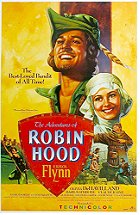
 0 comments,
0 comments, 